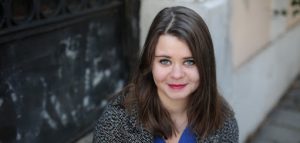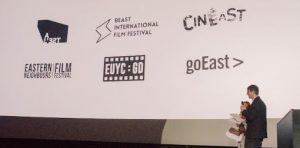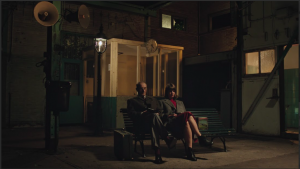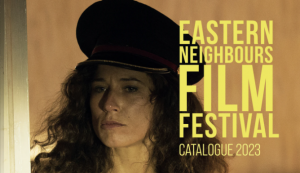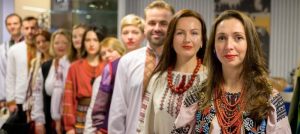
Svetlana Yancheva: I Prefer Not to Be Compared to Anyone, Even to Frances McDormand
Interview by Tatjana Lisjak
Svetlana Yancheva is one of the best Bulgarian actresses of her generation. The last in a series of her notable roles is that of the sarcastic and seemingly rude widow Svetla in the film Fear, directed by theater and film veteran Ivaylo Hristov. It is a film set in a Bulgarian province that deals with xenophobia and fear of others after the arrival of migrants from Afghanistan. Praised by critics and audiences, Fear is full of humor as we are used to seeing in the classics of Czech masters such as Milos Forman or Jiri Menzel. Critics have highlighted its connection to Fassbinder’s masterpiece “Fear Eats the Soul,” and Yancheva has received praise for her masterful portrayal of a lonely woman entering into a relationship with a migrant. This Grand Prix winner at the prestigious Black Nights Festival and a Bulgarian Oscar nominee can be seen at the 13th edition of the Eastern Neighbors Film Festival. We spoke to the lead actress who revealed to us how she was preparing for this role and what she thinks of the foreign media’s praise for her role and film.
The film Fear received a lot of praise, primarily for directing, camera, and acting. The New York Times compared you to Frances McDormand. Do such comparisons flatter you? Would you say that this film is the highlight of your career?
It is always nice when there are positive reviews about your work in which you have invested your mind and heart. I would prefer not to be compared to anyone, not even an actress of such rank as Frances McDormand. More importantly, the film was noticed and well appreciated. Whether Fear is the highlight of my professional career – I don’t know, but it’s certainly one of the most exciting and meaningful things I’ve ever done.
You play the widow Svetla who loses her job as a teacher, lives alone, and bravely enters into a relationship with an African immigrant who encounters the disapproval of the villagers. How did you approach portraying this character? What were your biggest challenges?
Svetla’s storyline is very precisely and concretely drawn in the script – her actions and behavior are not accidental and there’s always a reason behind them. The moment I read the script it became clear to me what kind of character I would be dealing with. Moreover, Ivaylo Hristov wrote this screenplay keeping in mind that I will play the lead role like some other actors in the main cast. We play under our real names. It was all a matter of accumulation. Long before the shooting, we had conversations with Ivaylo, each scene had been discussed, the situations characters can get into, and how to develop it all. We rehearsed with Michael Fleming (Bamba), who is not a professional actor. It was important to check if we feel and make a connection with each other. The situation between us in the film was partly similar to that in life. He knows two or three words in Bulgarian and my English is not good. Different cultures, different upbringings and we had to meet somewhere. But we had a lot of fun in the process and we became really good friends. Concerning the characters’ relationship, the bony nut is this woman. Michael’s character is an open and kind person, even though he is a victim of unprovoked aggression. She has to overcome prejudices, complexes, fear, and the habit of living alone like a dog. In some sense, she is like him, an alien in her own country. My goal was to show how my character, in the process of meeting Bamba, gradually overcomes her psychological barriers but also bearing in mind that her cultural-historical origins and her hard life cannot allow her to change so easily and completely. There is some warmth and tenderness towards Bamba, but within the convincing – no more, no less. Also, it was important for me to find the right, in a sense balanced reaction in situations that are on the border of the real and the absurd.
This is not the first time that you have collaborated with director Ivaylo Hristov, who is, like yourself, a household name in Bulgaria. How well do you know each other and is it easier to work with a director who is a renowned actor himself?
Ivaylo Hristov and I worked on several films together in which we have partnered as actors. He is one of the greatest Bulgarian actors and I’m a big admirer of him. I will not hide that working with him as an actor, and later as a director feels like a holiday because he is my soul mate. And yes, being an actor is a big plus for him as a director. He knows the nature of acting very well, what an actor needs, and how to be led. I felt safe with him because the film was in his head and he knew exactly what he wanted to achieve, not to mention his great sense of humor that did not fail even in the most critical moments.
The backbone of the film is xenophobia and fear of others. Bulgaria is one of the European countries facing a migrant crisis in recent years, but also has its internal problems such as poverty and unemployment, as seen in the film. Do you think that films like this, which reflect reality, help raise awareness about social circumstances and have an enlightening effect?
I believe that the problems the film Fear touches on are not just local. They concern the world in general, not only Bulgaria and Europe. If only watching such films could fix things, they would have been fixed by now, but it isn’t the case. Of course, these are important messages, and the artist must have a position and speak it out loud. We must make such small revolutions, and I hope that something will shine somewhere. Cinema can be a very powerful weapon, as long as you are infinitely honest and aim right at the heart. I’ll be very happy if Fear could be perceived as a modest part of this attempt to cure the ills of society.
What are the reactions to the film, its critique of society, and the humanistic message at home and abroad? Are there any differences?
I have read many more reviews in the foreign press than in the Bulgarian one. The film came out during the pandemic and I believe that this created problems for its proper distribution. The movie received many awards, including the ones at the largest festival of Bulgarian cinema “Golden Rose”. But there wasn’t a serious conversation about the film, no matter negative or positive (I’m not talking about the small circle of colleagues, friends, and tempted viewers). I have heard many extreme opinions on the anachronism of key problems, discussed in the film, such as racial hatred and unprovoked violence. I think that the current situation with the war in Ukraine, with the horrors that Putin’s regime inflicts on innocent people, has shown the struggle for humanism and inter-ethnic tolerance, which has been evident over the past two centuries, is not over yet. The danger has not passed. And that scares me.


